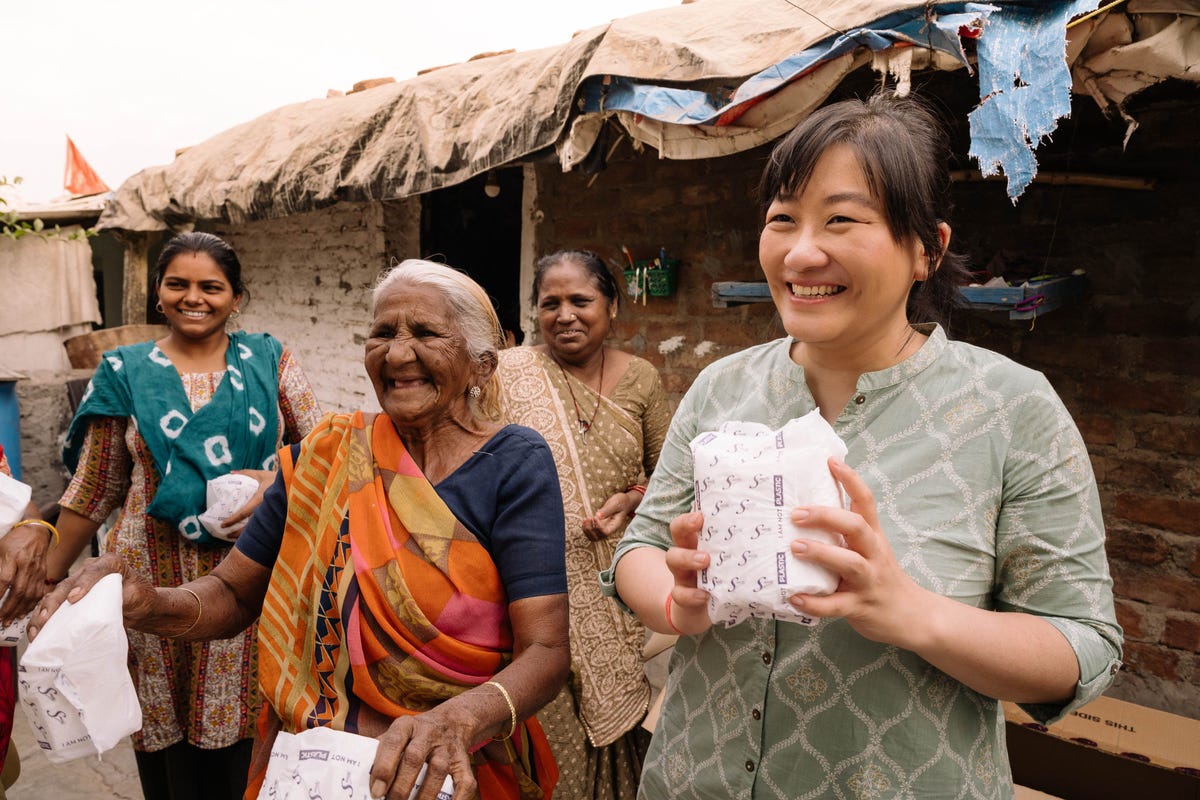KRISTIN KAGETSU
SOLVING THE SANITARY PAD ACCESS GAP WHILE PRESERVING THE PLANET
How safe, sustainable menstrual products can steer Indian women to success.
This series of articles showcases our 2025 Impact Awardees. The Impact Awards are dedicated to former Cartier Women's Initiative Fellows who have achieved extraordinary impact. Each of these nine exceptional women impact entrepreneurs has an inspiring story to tell about her journey to success.
This is the story of Kristin Kagetsu, a 2018 fellow and 2025 Impact Awardee.
For a teenager in rural India, a simple package of sanitary pads can change everything. It’s no exaggeration to say that a box of menstrual products can be a ticket to opportunity and success for a young girl who simply wants to go to school.
In some parts of India, the taboo against menstrual hygiene and a lack of access to safe, hygienic and affordable menstrual products combine to keep girls and women out of education and work for up to 50 days per year. As a result, girls end up dropping out of school at a shocking rate of almost 23 million per year. Of those who stick it out, many end up falling behind in their studies, or struggling to maintain steady employment when they enter the workforce.
64% of Indian women and girls are unable to access the hygiene products they need and are therefore blocked from achieving their true potential. The impact of solving this menstrual product access gap is enormous.

Activating plan B
However, manufacturing sanitary pads was not Kristin’s original plan. She studied Mechanical Engineering at the Massachusetts Institute of Technology and actually intended to contribute one step further back in the supply chain — by developing and selling the machines that produce sanitary pads.
Born in the United States, Kristin moved to India a few years after college to put her plan in motion. Upon arrival, she was confronted by the scale of plastic waste India was already tackling, including from menstrual products, and had the stark realization that though she wanted to address access to menstrual products, she didn’t want to create a plastic pollution problem.
It was time to pivot. She soon realized the opportunity to tackle making sanitary products more widely available without contributing to plastic pollution — biodegradable sanitary pads. But how to achieve this?
After much experimentation, Kristin and her team hit on a solution: banana fiber. This strong material is a byproduct of banana farming made from the waste stems of the dead plants. Even better, it could be sourced locally, providing an additional income source to banana farmers.
More than a revolutionary pad design
Saathi directly addresses two of the most pressing global environmental challenges: plastic pollution and climate change. By reducing reliance on plastic and promoting biodegradable alternatives, Saathi contributes to mitigating the harmful effects of plastic waste on ecosystems and human health. The numbers speak for themselves. Saathi pads biodegrade within six months of disposal, 1,200 times faster than conventional pads. Banana farming also uses six times less water and 10 times less fertilizer than the cotton used by many of its competitors. So far, Saathi pads have replaced 92 metric tons of plastic waste, as a woman using Saathi pads will avoid 60 kg of sanitary pad waste over her lifetime. This all translates to a 161 metric ton reduction in carbon emissions. As the used pads can be upcycled into compost, biogas or electricity, they have the potential to reduce even more emissions in the future.
However, what makes Saathi truly special is how Kristin has built impact directly into her business model.
For example, Saathi subsidizes pads for non-governmental organizations and nonprofits that are committed to improving access to sanitary pads and health education for women.
In addition, its pads are manufactured and distributed exclusively by women from underserved communities, with 485 women employed so far. Saathi therefore not only empowers women and girls by providing them with pads that enable them to attend more days of school or work — it also empowers them through the creation of livelihood opportunities.
A global reach
Saathi’s products are now distributed beyond India in countries including the United Kingdom, Kenya and Malaysia. Its corporate partners in India provide Saathi pads to their staff.
Kristin is proud of her impact so far but determined to deepen it. She concludes, “The need to preserve our planet is so urgent — we must be bold and ambitious. Our goal is to create a model for sustainable manufacturing that also has a positive impact on the community.”
PHOTO GALLERY
Read More

Awards
2025 Impact Awards
Explore the 2025 edition of the Cartier Women's Initiative Impact Awards.

Community
Kristin Kagetsu
Find out more about Kristin Kagetsu, 2018 fellow, 2025 Impact Awardee, and co-founder of Saathi.

Insights
Blog
Click here to discover the other 2025 Impact Awardees, or read community success stories.






